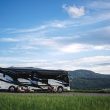If you like to hibernate during the winter months and hold on your RVing adventures till it’s warmer out, you aren’t alone. But, spring is just around the corner and it’s time to get your RV or motorhome back into top shape! Before you head on your first RV trip of 2019, it’s crucial to make sure everything is as you left in before putting up your RV for the winter season. Below are a few tips from us that we think are most important. Happy RVing!
Check for leaks around the exterior
Water leaks are one of the biggest problems that are found on RVS after the winter months. Look around your roof and all the caulking around windows, air vents, AC units and doors to check for any cracks or chips in the caulk. The smallest amount of missing caulk could cause a massive leak which would lead to water damage in your RV.
Make sure your tires haven’t dry rotted
While you’re pumping those babies full of air for future trips, check for sidewall cracks or cracks between threads. If you see any, your tires have more than likely dry rotted and it’s best to get new ones. If they’re clear of cracks, you’re ready to set them to the correct tire pressure. To find what’s right for your tires, you can check your RV manual for the right PSI or you can check your RV for a decal that tells you information about your tires.
Inspect and clean all appliances
Cleaning appliances isn’t too important to a successful RV trip, but while you’re cleaning, you might come across something that’s seriously wrong with an essential appliance like your stove or microwave. You’ll also probably find spiderwebs, dust, dead bugs and maybe small critters. Again, it’s not crucial, but don’t you want to start the season off with a clean RV?
Check all batteries
This is a good general tip to keep your batteries in great shape, no matter what season you’re preparing for. Before you start, throw on a pair of protective gloves in case you come in contact with battery acid and make sure everything is off in your RV and make sure the main switch is turned off. Check and clean any tarnished terminals, connections and battery trays. If you take any batteries out, make sure you disconnect and reconnect it the correct way. Each season is the perfect time for testing your battery, too. Just take and it out and bring it to a professional.
Water!
Before you fill your RV up with water, make sure all valves are turned to “normal” and make sure all the faucets are closed. Once you start the process, turn on a hot and cold water faucet to allow any air to escape until the water flows regularly. Basically, you just want to fill your fresh water tank up then use your water pump to run clean water through the lines to clear away any anti-freeze. Then, you can check all your faucets, pipes, your water heater over pressure safety valve and the water heater plug for drainage to check for leaks. A great and easy way to check for leaks is to pressurize the water system with a pump. Then, turn the pump off and wait about 30 minutes. When you turn the pump back on, it shouldn’t make any noise. If the pump does make noise when you turn it on, unfortunately, you have a leak somewhere.
Have your LP (Liquid Propane) gas system for leaks
Before you check your L.P. make sure all of your L.P. appliances are turned off, then make sure there aren’t any open flames or sparks are near, and then check to make sure your leak detector is turned on inside your RV. Now you’re ready to check your liquid propane! Open your valves on your tank and smell around for any leaks. Then check your valves and regulators by using soapy water. If use suspect any leaks at all, have a professional fix it for you. Sometimes seals dry out over seasons which cause leaks that weren’t there before.
Generator
To prepare your generator, you’ll have to start it up and check for all the functions. It can be difficult to get it started back up after it sits for extended periods of time and the lack of gas in the lines is more than likely the reason why your generator isn’t starting. Turn your generator on for 20-30 seconds to deliver fuel to the pump. Once it’s been running for a while, check the oil level. Check the air filter for nests and make sure your generator doesn’t need a new one.
Waste tank valves
Check out the valve seal on your waste tank. Move the handle slowly in and out to make sure it closes and opens correctly. You might want to take your RV to a dump station first, hook it up and then check your valves. These valve seals can dry out which makes them harder to operate. If the valve seal isn’t opening easily, you can purchase a valve lube.
How do you prepare your RV for Spring? Let us know!
Don’t forget to stay up to date with all of our exciting RV and camping content on Facebook, Twitter and Instagram!






